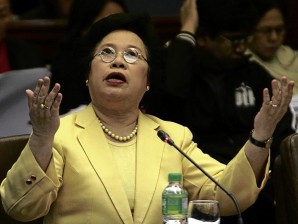MANILA, Philippines – Senator Miriam Defensor-Santiago has formally asked the Commission on Appointments to look into the alleged widespread abuse of government’s savings amid controversy involving the Senate’s own budget.
In a letter to COA chairperson Ma. Gracia Pulito-Tan on Thursday, Santiago also requested the agency to upload on the Internet the total income of all high public officials.
“This is to respectfully request a COA study, report, and recommendation on the reported widespread abuse of the constitutional word ‘savings’ and the constitutional phrase ‘public p urpose’ as well as on my proposed internet upload of the total income (not merely salary) and the discretionary funds of every high public official,” she said in her letter.
“The purpose of this request is to advise the Senate committee on revision of code and laws, which I chair, on a potential bill to reduce corruption, by stopping such abuses and by giving the public what they have the right to know— the total income of high public officials, not just their salaries,” she said.
Santiago pointed out that under Section 25, Article 6 of the Constitution, the heads of the three branches of government – executive, legislative, and the judiciary – as well as the heads of the constitutional commissions “may, by law, be authorized to augment any item in the general appropriations law for their respective offices from savings in other items for their respective appropriations.”
“This raises several issues. The Constitution enumerates the highest officials of h the land as authorized to exercise this power but why is this power also exercised by the heads of apparently all government offices?” she asked.
“Should not COA enumerate what savings are valid, so as to prevent heads of offices from refusing to incur necessary expenses in order to produce savings that will b e distributed among themselves at yearend?”
“If an office always claims to have savings at yearend, should not COA resident auditor be duty-bound to recommend that the next year’s appropriation for the item should be reduced?” she further asked.
Also under Section 25 of the Constitution, Santiago said “discretionary funds appropriated for particular officials shall be disbursed only for public purposes to be supported by appropriate vouchers.”
In the Senate and the House of Representatives, one discretionary fund consists of additional MOOE (maintenance and other operating expenses) during the year, most notable she said “in effect constituting a Christmas gift to every senator and representative.”
“This also raises several issues. Is it a valid public purpose to give a legislator additional MOOE when it is already the end of the year?” she said.
“Can such additional MOOE be treated by the senator as additional pork barrel to be spent, not on office expenses but on alleged charitable donations or public works projects? Should not COA also enumerate which public purposes are valid so as to prevent abuse?”
In these cases involving valid definitions of “savings “ and “public purposes,” Santiago said it is only the Supreme Court that can authoritatively settle the issue.
“But under the administrative law principle of primary jurisdiction, the interpretation of any law by the government agency charged to execute it is granted the proper respect and presumption of validity, unless otherwise reversed by the Supreme Court,” she pointed out.
Santiago also requested the COA to upload on the Internet the “potential income” of ever president, vice president, senator, representative, cabinet member, head of a nationwide bureau and similar high officials.
The total income, she said, should consist not only of the fixed salary but also other sources of income.
“In addition, COA should indicate the discretionary funds at the disposal of such high public officials whatever they are called: confidential funds, intelligence funds, etc. This would serve the constitutional purpose of public accountability,” Santiago added.
